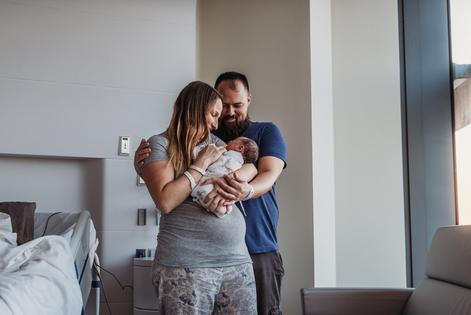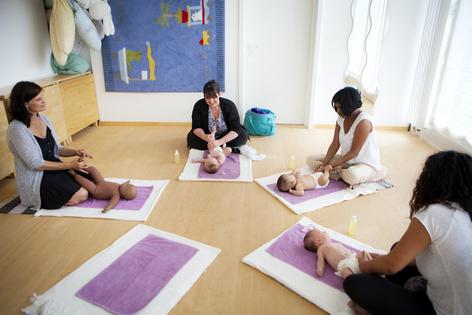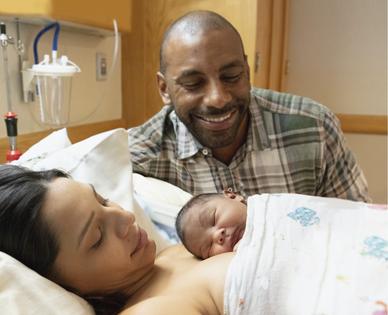Birth of a story: How new parents find meaning after childbirth hints at how they will adjust
Published in News & Features
Gather a group of new parents and the conversation will likely turn to their childbirth stories – ranging from the joyful to the gnarly to the positively traumatic. Birth story podcasts and websites feature a curated range of birth experiences, and you can buy embossed leather “birth story” journals as a baby shower gift. People are fascinated by this pivotal, emotionally complex and literally life-and-death experience.
Birth narratives might also contain clues about how the adjustment to parenthood will go.
People have long used stories to understand difficult experiences. Stories may be particularly valuable as a source of “meaning-making,” the process of finding order in chaos by making sense of unexpected events, identifying silver linings and discovering the patterns and connections that thread seemingly random events together into a coherent narrative.
In a new study led by Geoffrey Corner, a former graduate student in my lab, we found that the levels of meaning-making in the stories new parents told about their baby’s birth predicted their relationship quality and parenting stress in the child’s first months.
Finding meaningful themes and patterns in life’s seeming randomness is a fundamentally human activity. As writer Joan Didion put it, “we tell ourselves stories in order to live.”
“Meaning-making” can buffer despair in the wake of tragedy. Holocaust survivor Victor Frankl’s memoir, “Man’s Search for Meaning,” argued that meaning and purpose can prevent the bitterness and disillusionment that can otherwise fester after great loss. Research on what psychologists call post-traumatic growth has found that the level of “meaning-making” in people’s narratives about a difficult event predicts their mental health over time.
For example, studies have found links between meaning-making and resilience in cancer patients, bereaved parents and caregivers. Cancer survivors might discover that their chemo ordeal brought them closer to friends and family, or helped them step back from the hustle of everyday life and embrace a slower pace.
Although childbirth is typically experienced as a joyful rather than a tragic event, it can still be unpredictable, frightening and even life-threatening. Indeed, psychologists have begun to recognize that particularly difficult labors can trigger post-traumatic stress symptoms, not just in mothers but in their partners as well. Even normal, nontraumatic births require parents to cope with hours, sometimes days, of pain and discomfort. Therefore, we hypothesized that meaning-making might be an important part of couples’ birth narratives, potentially promoting resilience in new parents.
To test these hypotheses, we collected birth stories from 77 couples who were participating in our lab’s longitudinal study of the transition to parenthood. We visited couples at the hospital within a day or two of their infant’s birth, and audio-recorded them sharing their stories together. We told couples, “We’d like to hear you tell the story of your birth experience. Start from the beginning and tell us as much as you remember.”
A team of coders listened to each story and recorded examples of meaning-making, using three categories established in the research literature:
Sense-making: Identifying reasons that an event might have unfolded the way it did or making connections that show why an event was meaningful. For example, one mother in our sample found meaning in her long labor, describing her baby as “very brave and tough” because she survived hours of pushing.
Benefit-finding: Pointing out silver linings or unexpected positive effects of a difficult experience. For example, after a difficult birth, one parent in our sample stated, “It was scary, but the nurses and the doctors were so nice to us.”
Change in identity: Describing how an event has transformed one’s sense of self. As a parent in our sample said, “I feel like my life has changed completely with the baby now here.”
Although couples told their story together, we tracked meaning-making separately for each partner. We also rated how much each partner participated in telling their story so we could adjust for their levels of engagement in sharing their birth narrative.
The couples in our sample were avid “meaning makers”: Almost all the participants made at least some meaning-making statements in their birth stories. Of the three categories of meaning-making, “change in identity” language surfaced least often, appearing in about 37% of the birth stories. Mothers tended to use more “sense-making” and “benefit-finding” language than fathers. And both members of a couple tended to use similar amounts of meaning-making language.
After we had coded all of the narratives, we next looked to see whether “meaning-making” predicted relationship satisfaction and parenting stress in our couples. The transition to parenthood can be a “crisis event” for the couple relationship and is often linked with declines in relationship quality.
But when mothers used more “sense-making” and “benefit-finding” language, they showed a smaller drop in their relationship satisfaction than moms who used less. Fathers who used more “sense-making” and “benefit-finding” language reported lower parenting stress at six months postpartum than dads who used less.
And partners of fathers who used more “change in identity” language also reported lower parenting stress later on, suggesting that dads who experience the transition to parenthood as transformative may be able to help mothers cope better with new parenthood. On the flip side, though, when mothers showed more meaning-making, their partners actually reported more parenting stress at six months postpartum. It may be that when mothers find the birth experience to be more personally meaningful, partners feel left out or pressured to step up their own parenting.
Overall, these results supported our initial hunch that meaning-making might be detectable in birth narratives and forecast parents’ psychological adjustment after birth. Greater meaning-making language seemed to benefit the couple relationship and largely buffer parenting stress.
This study was limited by a fairly small sample of cohabiting heterosexual parents. Nevertheless, it highlights the value of stories in shaping family transitions. For therapists working with new parents in the wake of a difficult birth, encouraging couples to seek meaning in their birth story may help ease their transition to parenthood. Journaling and storytelling exercises may help couples process their feelings about their childbirth experiences. After all, the birth of a baby is also the birth of a story – and that story is well worth telling.
This article is republished from The Conversation, an independent nonprofit news site dedicated to sharing ideas from academic experts. If you found it interesting, you could subscribe to our weekly newsletter.
Read more:
Have children? Here’s how kids ruin your romantic relationship
Fatherhood changes men’s brains, according to before-and-after MRI scans
Darby Saxbe receives funding from the National Institutes of Health and the National Science Foundation.















Comments